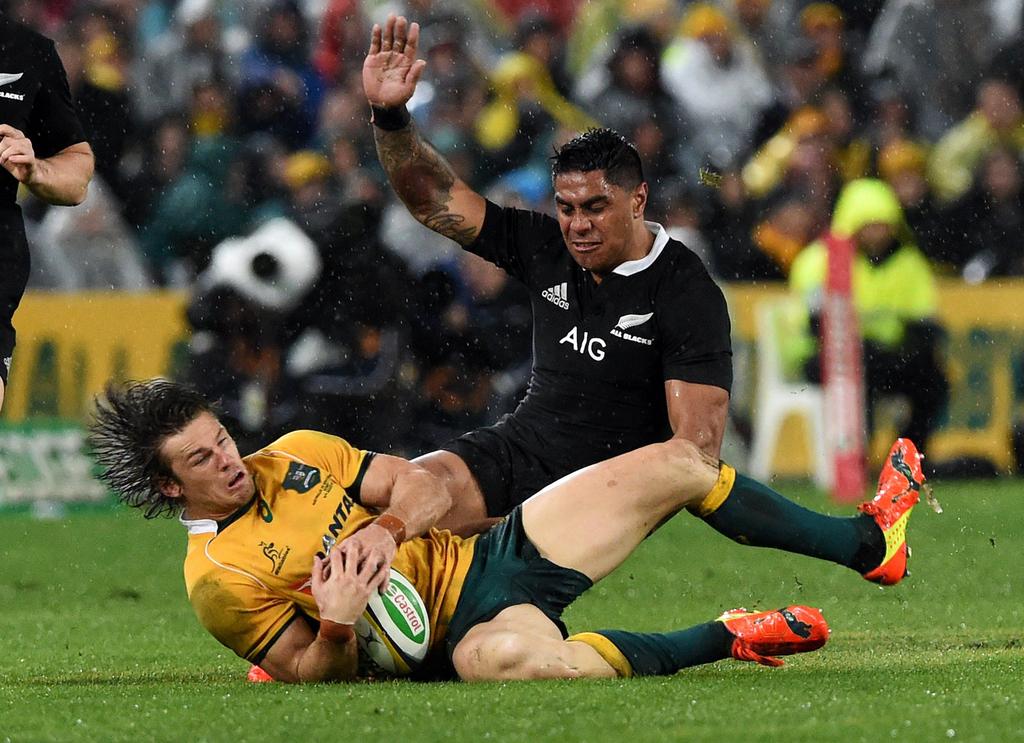SYDNEY // Drop goals remain a part of Australia’s attacking armoury despite their failure to take the option in the dying minutes of last weekend’s draw with the All Blacks, winger Rob Horne said on Monday.
Australia drew 12-12 with New Zealand in a tight, try-less encounter played out in a Sydney rainstorm on Saturday, coming up short of a famous victory to start the Rugby Championship despite having an extra man for most of the last 10 minutes.
Presented with a late attacking scrum close to the position where England’s Jonny Wilkinson dropped a goal to win England the 2003 World Cup, many expected to see replacement fly-half Bernard Foley drop back into the pocket.
The Wallabies, however, kept the ball in hand looking for a penalty but lost possession when they themselves were penalised at the next breakdown – the chance of a first win over the world champions in three years gone.
It was an echo of the 18-18 draw in Brisbane in 2012 – the last time Australia got any kind of result against the All Blacks – when Kurtley Beale spurned the chance to kick at goal from open play in the last few minutes.
The Wallabies have benefited from drop goals in the past, most notably when Stephen Larkham dropped a 48-metre bomb to beat South Africa in extra time in the 1999 World Cup semi-final.
It appears to be a dying art Down Under, though, and Australian teams scored only two drop goals in the entire Super Rugby competition this year, compared to 18 successful attempts for South African teams.
Asked whether Australian rugby players now had an inbuilt cultural disdain for the three points from open play, Horne said he thought not. I know heading into that last scrum, Bernard was talking to us about setting it up so it definitely was in the minds of the guys,” he said. “We’re trying to win games, we’re not trying to make any philosophical statements. Of course we want to score tries, but if it came down to that, then it comes down to that. It’s not the first thing we want to go to, that’s not how we play, but as a last-minute option, certainly.”
The draw left a “strange” atmosphere in the Australian dressing room, Horne said, and they go to Auckland on the weekend still needing to win both of the remaining matches against the All Blacks this year to win back the Bledisloe Cup. The long-range forecast indicates that they might not have to deal with another rainy night but, whatever the weather brings, Australia will try to beat the All Blacks at Eden Park for the first time since 1986 by scoring tries.
“They deserve a lot of respect and how they play the game dictates how you play the game,” Horne said. “So as much as we can play our style and play the Australian way – we feel like we can score a lot of tries – moving forward in this competition, that’s how we’re going to be successful.
“Because the All Blacks, the Springboks and Pumas have a lot of strikepower out wide and if you are not scoring tries then you are not winning.”
IRB buoyed by the response women’s tournament got in France
World rugby union’s governing body, the IRB, has vowed to do “everything” to grow the women’s game after a highly successful World Cup won by England.
The tournament captured the imagination of a French public, who tuned in to the matches in their millions on television and came in their thousands to grounds to watch matches live. Such fervour in a country known for particularly fickle fans has been a major boost for the International Rugby Board (IRB) as it looks ahead to the Rio Olympics in 2016 when men’s and women’s rugby sevens will make their debut.
“The fact that so many spectators have come to watch, as well as record television audiences at home, is a testament to the quality of rugby that has been on display,” IRB president Bernard Lapasset said after watching England beat Canada 21-9 in Sunday’s final.
“The women’s game is certainly on the up and we will be doing everything we can at the IRB to make sure that upward trend continues.”
Lapasset heaped praise on the final day of competition, with France finishing third after outgunning Ireland 25-18 at Stade Jean Bouin, the western Parisian home of Top 14 club Stade Francais, before England took centre stage.
“What an amazing way to finish an amazing women’s Rugby World Cup,” the Frenchman said.
“The TV and media coverage, the atmosphere at the matches and the way that this tournament has captured the public’s imagination has been remarkable.
“I send my congratulations to England who played so well, but also to Canada who won so many fans here during this World Cup.”
sports@thenational.ae
Follow our sports coverage on Twitter @SprtNationalUAE





